ENG5001 Portfolio 1: Reflection on Engineering Skills and Attributes
VerifiedAdded on 2021/10/01
|21
|9742
|234
Portfolio
AI Summary
This portfolio, submitted for ENG5001, focuses on the development of professional skills in engineering. It analyzes Engineers Australia Stage 1 competencies, qualities of a USQ graduate, and generic attributes, reflecting on the student's past experiences and future ambitions in the field. The portfolio covers knowledge and skill base, engineering application ability, and professional attributes. Furthermore, it defines hard and soft skills desired by the industry, including project management and sustainable practices, and includes a reflection on a research project regarding population growth. The document also reflects on the effectiveness of teamwork and provides relevant appendices. This assignment offers a comprehensive overview of the student's professional development and understanding of engineering principles, with a focus on electrical engineering and renewable energy.
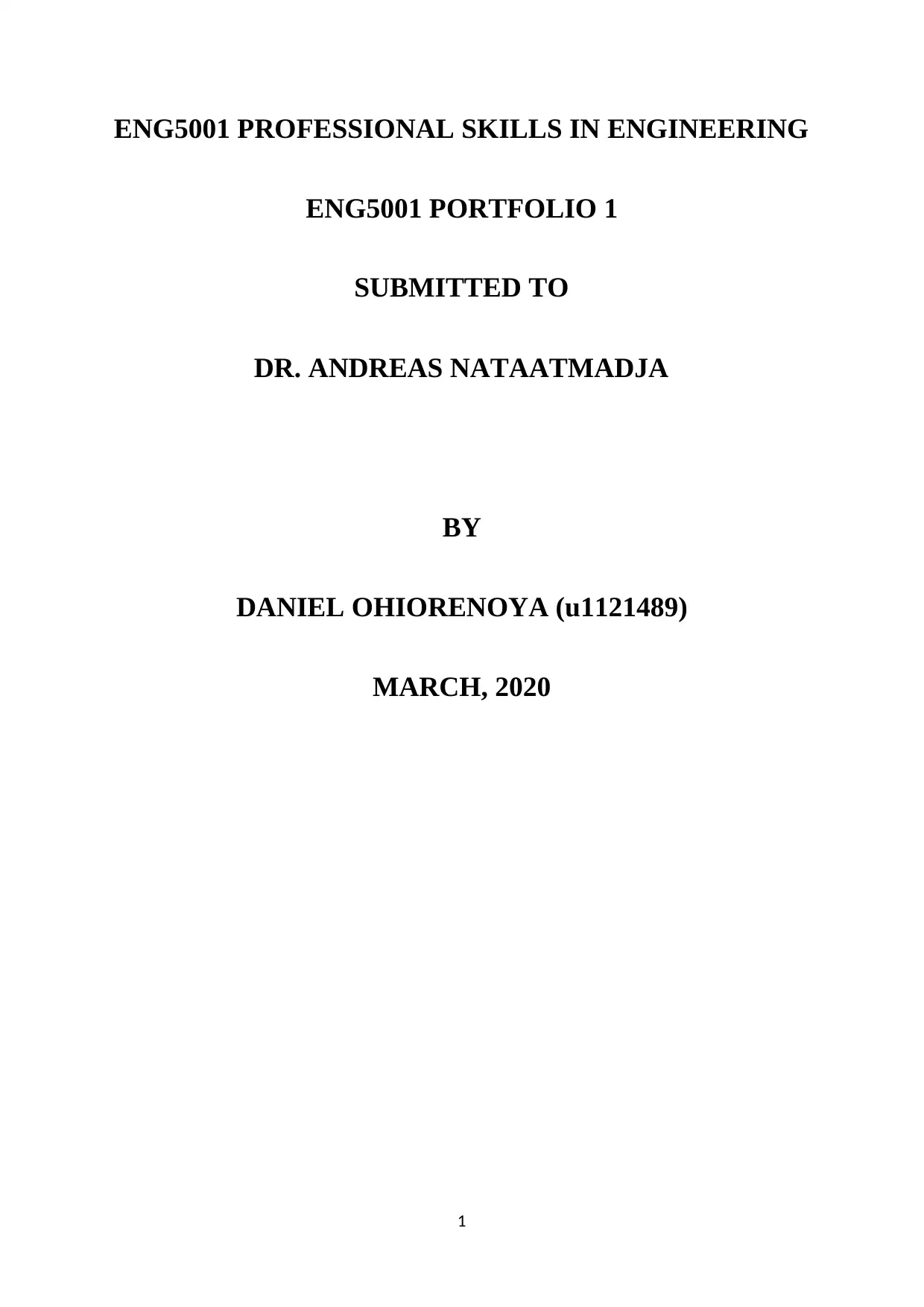
1
ENG5001 PROFESSIONAL SKILLS IN ENGINEERING
ENG5001 PORTFOLIO 1
SUBMITTED TO
DR. ANDREAS NATAATMADJA
BY
DANIEL OHIORENOYA (u1121489)
MARCH, 2020
ENG5001 PROFESSIONAL SKILLS IN ENGINEERING
ENG5001 PORTFOLIO 1
SUBMITTED TO
DR. ANDREAS NATAATMADJA
BY
DANIEL OHIORENOYA (u1121489)
MARCH, 2020
Paraphrase This Document
Need a fresh take? Get an instant paraphrase of this document with our AI Paraphraser
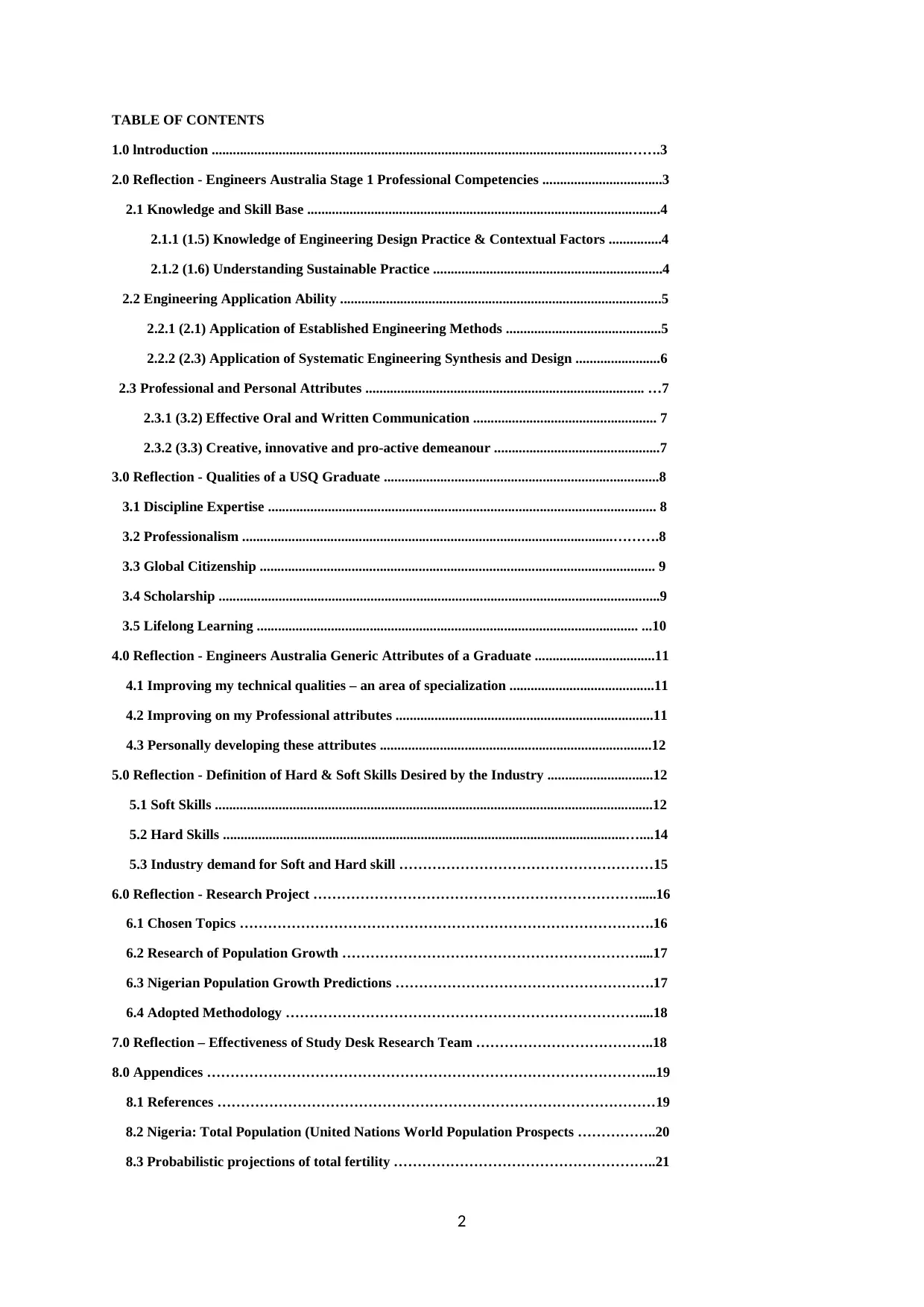
2
TABLE OF CONTENTS
1.0 lntroduction ......................................................................................................................…….3
2.0 Reflection - Engineers Australia Stage 1 Professional Competencies ..................................3
2.1 Knowledge and Skill Base ....................................................................................................4
2.1.1 (1.5) Knowledge of Engineering Design Practice & Contextual Factors ...............4
2.1.2 (1.6) Understanding Sustainable Practice .................................................................4
2.2 Engineering Application Ability ...........................................................................................5
2.2.1 (2.1) Application of Established Engineering Methods ............................................5
2.2.2 (2.3) Application of Systematic Engineering Synthesis and Design ........................6
2.3 Professional and Personal Attributes ............................................................................... …7
2.3.1 (3.2) Effective Oral and Written Communication .................................................... 7
2.3.2 (3.3) Creative, innovative and pro-active demeanour ...............................................7
3.0 Reflection - Qualities of a USQ Graduate ..............................................................................8
3.1 Discipline Expertise .............................................................................................................. 8
3.2 Professionalism .........................................................................................................……….8
3.3 Global Citizenship ................................................................................................................ 9
3.4 Scholarship .............................................................................................................................9
3.5 Lifelong Learning ............................................................................................................ ...10
4.0 Reflection - Engineers Australia Generic Attributes of a Graduate ..................................11
4.1 Improving my technical qualities – an area of specialization .........................................11
4.2 Improving on my Professional attributes .........................................................................11
4.3 Personally developing these attributes .............................................................................12
5.0 Reflection - Definition of Hard & Soft Skills Desired by the Industry ..............................12
5.1 Soft Skills ............................................................................................................................12
5.2 Hard Skills ..................................................................................................................…....14
5.3 Industry demand for Soft and Hard skill ………………………………………………15
6.0 Reflection - Research Project …………………………………………………………….....16
6.1 Chosen Topics …………………………………………………………………………….16
6.2 Research of Population Growth ………………………………………………………....17
6.3 Nigerian Population Growth Predictions ……………………………………………….17
6.4 Adopted Methodology …………………………………………………………………....18
7.0 Reflection – Effectiveness of Study Desk Research Team ………………………………..18
8.0 Appendices …………………………………………………………………………………...19
8.1 References …………………………………………………………………………………19
8.2 Nigeria: Total Population (United Nations World Population Prospects ……………..20
8.3 Probabilistic projections of total fertility ………………………………………………..21
TABLE OF CONTENTS
1.0 lntroduction ......................................................................................................................…….3
2.0 Reflection - Engineers Australia Stage 1 Professional Competencies ..................................3
2.1 Knowledge and Skill Base ....................................................................................................4
2.1.1 (1.5) Knowledge of Engineering Design Practice & Contextual Factors ...............4
2.1.2 (1.6) Understanding Sustainable Practice .................................................................4
2.2 Engineering Application Ability ...........................................................................................5
2.2.1 (2.1) Application of Established Engineering Methods ............................................5
2.2.2 (2.3) Application of Systematic Engineering Synthesis and Design ........................6
2.3 Professional and Personal Attributes ............................................................................... …7
2.3.1 (3.2) Effective Oral and Written Communication .................................................... 7
2.3.2 (3.3) Creative, innovative and pro-active demeanour ...............................................7
3.0 Reflection - Qualities of a USQ Graduate ..............................................................................8
3.1 Discipline Expertise .............................................................................................................. 8
3.2 Professionalism .........................................................................................................……….8
3.3 Global Citizenship ................................................................................................................ 9
3.4 Scholarship .............................................................................................................................9
3.5 Lifelong Learning ............................................................................................................ ...10
4.0 Reflection - Engineers Australia Generic Attributes of a Graduate ..................................11
4.1 Improving my technical qualities – an area of specialization .........................................11
4.2 Improving on my Professional attributes .........................................................................11
4.3 Personally developing these attributes .............................................................................12
5.0 Reflection - Definition of Hard & Soft Skills Desired by the Industry ..............................12
5.1 Soft Skills ............................................................................................................................12
5.2 Hard Skills ..................................................................................................................…....14
5.3 Industry demand for Soft and Hard skill ………………………………………………15
6.0 Reflection - Research Project …………………………………………………………….....16
6.1 Chosen Topics …………………………………………………………………………….16
6.2 Research of Population Growth ………………………………………………………....17
6.3 Nigerian Population Growth Predictions ……………………………………………….17
6.4 Adopted Methodology …………………………………………………………………....18
7.0 Reflection – Effectiveness of Study Desk Research Team ………………………………..18
8.0 Appendices …………………………………………………………………………………...19
8.1 References …………………………………………………………………………………19
8.2 Nigeria: Total Population (United Nations World Population Prospects ……………..20
8.3 Probabilistic projections of total fertility ………………………………………………..21
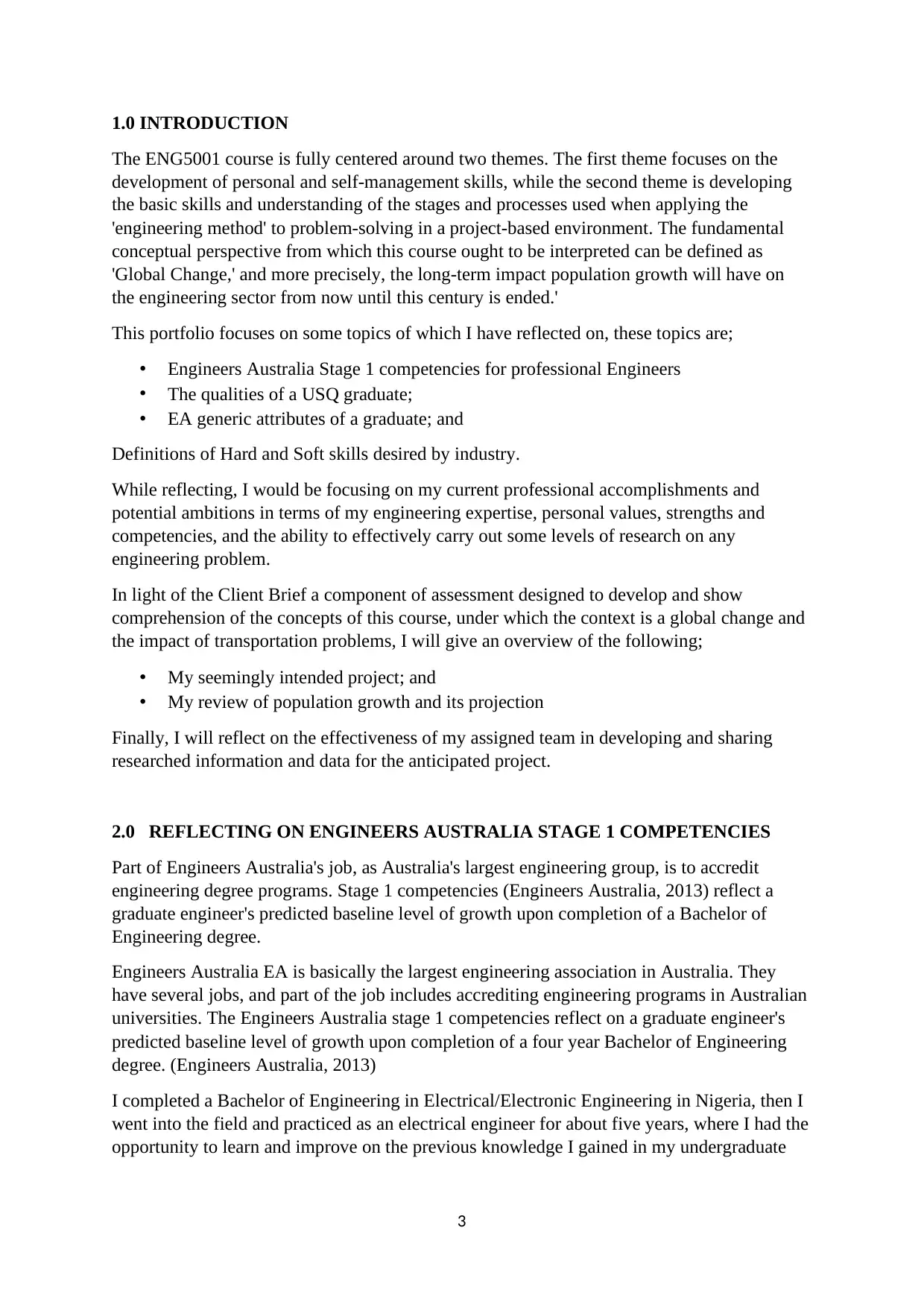
3
1.0 INTRODUCTION
The ENG5001 course is fully centered around two themes. The first theme focuses on the
development of personal and self-management skills, while the second theme is developing
the basic skills and understanding of the stages and processes used when applying the
'engineering method' to problem-solving in a project-based environment. The fundamental
conceptual perspective from which this course ought to be interpreted can be defined as
'Global Change,' and more precisely, the long-term impact population growth will have on
the engineering sector from now until this century is ended.'
This portfolio focuses on some topics of which I have reflected on, these topics are;
• Engineers Australia Stage 1 competencies for professional Engineers
• The qualities of a USQ graduate;
• EA generic attributes of a graduate; and
Definitions of Hard and Soft skills desired by industry.
While reflecting, I would be focusing on my current professional accomplishments and
potential ambitions in terms of my engineering expertise, personal values, strengths and
competencies, and the ability to effectively carry out some levels of research on any
engineering problem.
In light of the Client Brief a component of assessment designed to develop and show
comprehension of the concepts of this course, under which the context is a global change and
the impact of transportation problems, I will give an overview of the following;
• My seemingly intended project; and
• My review of population growth and its projection
Finally, I will reflect on the effectiveness of my assigned team in developing and sharing
researched information and data for the anticipated project.
2.0 REFLECTING ON ENGINEERS AUSTRALIA STAGE 1 COMPETENCIES
Part of Engineers Australia's job, as Australia's largest engineering group, is to accredit
engineering degree programs. Stage 1 competencies (Engineers Australia, 2013) reflect a
graduate engineer's predicted baseline level of growth upon completion of a Bachelor of
Engineering degree.
Engineers Australia EA is basically the largest engineering association in Australia. They
have several jobs, and part of the job includes accrediting engineering programs in Australian
universities. The Engineers Australia stage 1 competencies reflect on a graduate engineer's
predicted baseline level of growth upon completion of a four year Bachelor of Engineering
degree. (Engineers Australia, 2013)
I completed a Bachelor of Engineering in Electrical/Electronic Engineering in Nigeria, then I
went into the field and practiced as an electrical engineer for about five years, where I had the
opportunity to learn and improve on the previous knowledge I gained in my undergraduate
1.0 INTRODUCTION
The ENG5001 course is fully centered around two themes. The first theme focuses on the
development of personal and self-management skills, while the second theme is developing
the basic skills and understanding of the stages and processes used when applying the
'engineering method' to problem-solving in a project-based environment. The fundamental
conceptual perspective from which this course ought to be interpreted can be defined as
'Global Change,' and more precisely, the long-term impact population growth will have on
the engineering sector from now until this century is ended.'
This portfolio focuses on some topics of which I have reflected on, these topics are;
• Engineers Australia Stage 1 competencies for professional Engineers
• The qualities of a USQ graduate;
• EA generic attributes of a graduate; and
Definitions of Hard and Soft skills desired by industry.
While reflecting, I would be focusing on my current professional accomplishments and
potential ambitions in terms of my engineering expertise, personal values, strengths and
competencies, and the ability to effectively carry out some levels of research on any
engineering problem.
In light of the Client Brief a component of assessment designed to develop and show
comprehension of the concepts of this course, under which the context is a global change and
the impact of transportation problems, I will give an overview of the following;
• My seemingly intended project; and
• My review of population growth and its projection
Finally, I will reflect on the effectiveness of my assigned team in developing and sharing
researched information and data for the anticipated project.
2.0 REFLECTING ON ENGINEERS AUSTRALIA STAGE 1 COMPETENCIES
Part of Engineers Australia's job, as Australia's largest engineering group, is to accredit
engineering degree programs. Stage 1 competencies (Engineers Australia, 2013) reflect a
graduate engineer's predicted baseline level of growth upon completion of a Bachelor of
Engineering degree.
Engineers Australia EA is basically the largest engineering association in Australia. They
have several jobs, and part of the job includes accrediting engineering programs in Australian
universities. The Engineers Australia stage 1 competencies reflect on a graduate engineer's
predicted baseline level of growth upon completion of a four year Bachelor of Engineering
degree. (Engineers Australia, 2013)
I completed a Bachelor of Engineering in Electrical/Electronic Engineering in Nigeria, then I
went into the field and practiced as an electrical engineer for about five years, where I had the
opportunity to learn and improve on the previous knowledge I gained in my undergraduate
⊘ This is a preview!⊘
Do you want full access?
Subscribe today to unlock all pages.

Trusted by 1+ million students worldwide
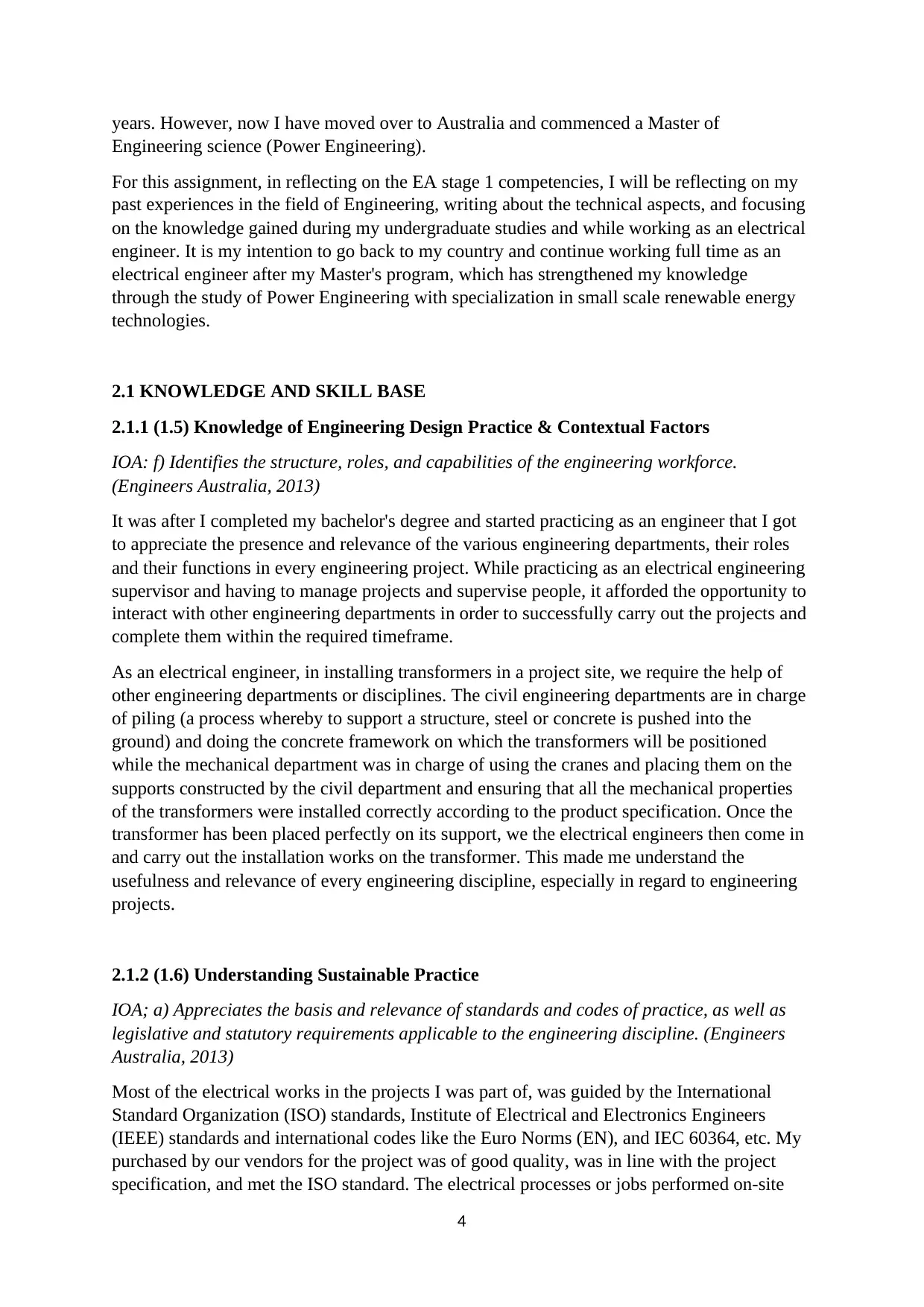
4
years. However, now I have moved over to Australia and commenced a Master of
Engineering science (Power Engineering).
For this assignment, in reflecting on the EA stage 1 competencies, I will be reflecting on my
past experiences in the field of Engineering, writing about the technical aspects, and focusing
on the knowledge gained during my undergraduate studies and while working as an electrical
engineer. It is my intention to go back to my country and continue working full time as an
electrical engineer after my Master's program, which has strengthened my knowledge
through the study of Power Engineering with specialization in small scale renewable energy
technologies.
2.1 KNOWLEDGE AND SKILL BASE
2.1.1 (1.5) Knowledge of Engineering Design Practice & Contextual Factors
IOA: f) Identifies the structure, roles, and capabilities of the engineering workforce.
(Engineers Australia, 2013)
It was after I completed my bachelor's degree and started practicing as an engineer that I got
to appreciate the presence and relevance of the various engineering departments, their roles
and their functions in every engineering project. While practicing as an electrical engineering
supervisor and having to manage projects and supervise people, it afforded the opportunity to
interact with other engineering departments in order to successfully carry out the projects and
complete them within the required timeframe.
As an electrical engineer, in installing transformers in a project site, we require the help of
other engineering departments or disciplines. The civil engineering departments are in charge
of piling (a process whereby to support a structure, steel or concrete is pushed into the
ground) and doing the concrete framework on which the transformers will be positioned
while the mechanical department was in charge of using the cranes and placing them on the
supports constructed by the civil department and ensuring that all the mechanical properties
of the transformers were installed correctly according to the product specification. Once the
transformer has been placed perfectly on its support, we the electrical engineers then come in
and carry out the installation works on the transformer. This made me understand the
usefulness and relevance of every engineering discipline, especially in regard to engineering
projects.
2.1.2 (1.6) Understanding Sustainable Practice
IOA; a) Appreciates the basis and relevance of standards and codes of practice, as well as
legislative and statutory requirements applicable to the engineering discipline. (Engineers
Australia, 2013)
Most of the electrical works in the projects I was part of, was guided by the International
Standard Organization (ISO) standards, Institute of Electrical and Electronics Engineers
(IEEE) standards and international codes like the Euro Norms (EN), and IEC 60364, etc. My
purchased by our vendors for the project was of good quality, was in line with the project
specification, and met the ISO standard. The electrical processes or jobs performed on-site
years. However, now I have moved over to Australia and commenced a Master of
Engineering science (Power Engineering).
For this assignment, in reflecting on the EA stage 1 competencies, I will be reflecting on my
past experiences in the field of Engineering, writing about the technical aspects, and focusing
on the knowledge gained during my undergraduate studies and while working as an electrical
engineer. It is my intention to go back to my country and continue working full time as an
electrical engineer after my Master's program, which has strengthened my knowledge
through the study of Power Engineering with specialization in small scale renewable energy
technologies.
2.1 KNOWLEDGE AND SKILL BASE
2.1.1 (1.5) Knowledge of Engineering Design Practice & Contextual Factors
IOA: f) Identifies the structure, roles, and capabilities of the engineering workforce.
(Engineers Australia, 2013)
It was after I completed my bachelor's degree and started practicing as an engineer that I got
to appreciate the presence and relevance of the various engineering departments, their roles
and their functions in every engineering project. While practicing as an electrical engineering
supervisor and having to manage projects and supervise people, it afforded the opportunity to
interact with other engineering departments in order to successfully carry out the projects and
complete them within the required timeframe.
As an electrical engineer, in installing transformers in a project site, we require the help of
other engineering departments or disciplines. The civil engineering departments are in charge
of piling (a process whereby to support a structure, steel or concrete is pushed into the
ground) and doing the concrete framework on which the transformers will be positioned
while the mechanical department was in charge of using the cranes and placing them on the
supports constructed by the civil department and ensuring that all the mechanical properties
of the transformers were installed correctly according to the product specification. Once the
transformer has been placed perfectly on its support, we the electrical engineers then come in
and carry out the installation works on the transformer. This made me understand the
usefulness and relevance of every engineering discipline, especially in regard to engineering
projects.
2.1.2 (1.6) Understanding Sustainable Practice
IOA; a) Appreciates the basis and relevance of standards and codes of practice, as well as
legislative and statutory requirements applicable to the engineering discipline. (Engineers
Australia, 2013)
Most of the electrical works in the projects I was part of, was guided by the International
Standard Organization (ISO) standards, Institute of Electrical and Electronics Engineers
(IEEE) standards and international codes like the Euro Norms (EN), and IEC 60364, etc. My
purchased by our vendors for the project was of good quality, was in line with the project
specification, and met the ISO standard. The electrical processes or jobs performed on-site
Paraphrase This Document
Need a fresh take? Get an instant paraphrase of this document with our AI Paraphraser
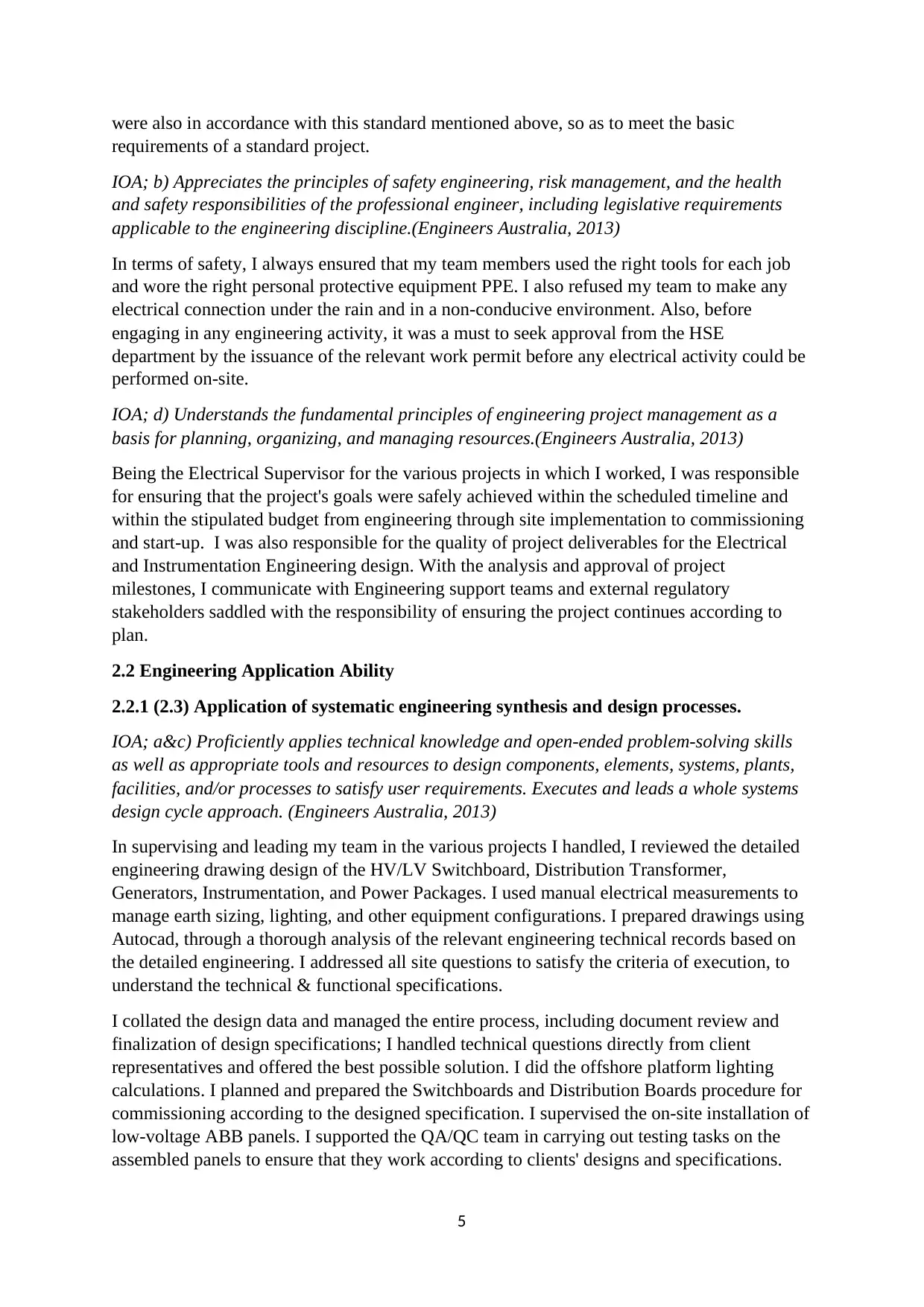
5
were also in accordance with this standard mentioned above, so as to meet the basic
requirements of a standard project.
IOA; b) Appreciates the principles of safety engineering, risk management, and the health
and safety responsibilities of the professional engineer, including legislative requirements
applicable to the engineering discipline.(Engineers Australia, 2013)
In terms of safety, I always ensured that my team members used the right tools for each job
and wore the right personal protective equipment PPE. I also refused my team to make any
electrical connection under the rain and in a non-conducive environment. Also, before
engaging in any engineering activity, it was a must to seek approval from the HSE
department by the issuance of the relevant work permit before any electrical activity could be
performed on-site.
IOA; d) Understands the fundamental principles of engineering project management as a
basis for planning, organizing, and managing resources.(Engineers Australia, 2013)
Being the Electrical Supervisor for the various projects in which I worked, I was responsible
for ensuring that the project's goals were safely achieved within the scheduled timeline and
within the stipulated budget from engineering through site implementation to commissioning
and start-up. I was also responsible for the quality of project deliverables for the Electrical
and Instrumentation Engineering design. With the analysis and approval of project
milestones, I communicate with Engineering support teams and external regulatory
stakeholders saddled with the responsibility of ensuring the project continues according to
plan.
2.2 Engineering Application Ability
2.2.1 (2.3) Application of systematic engineering synthesis and design processes.
IOA; a&c) Proficiently applies technical knowledge and open-ended problem-solving skills
as well as appropriate tools and resources to design components, elements, systems, plants,
facilities, and/or processes to satisfy user requirements. Executes and leads a whole systems
design cycle approach. (Engineers Australia, 2013)
In supervising and leading my team in the various projects I handled, I reviewed the detailed
engineering drawing design of the HV/LV Switchboard, Distribution Transformer,
Generators, Instrumentation, and Power Packages. I used manual electrical measurements to
manage earth sizing, lighting, and other equipment configurations. I prepared drawings using
Autocad, through a thorough analysis of the relevant engineering technical records based on
the detailed engineering. I addressed all site questions to satisfy the criteria of execution, to
understand the technical & functional specifications.
I collated the design data and managed the entire process, including document review and
finalization of design specifications; I handled technical questions directly from client
representatives and offered the best possible solution. I did the offshore platform lighting
calculations. I planned and prepared the Switchboards and Distribution Boards procedure for
commissioning according to the designed specification. I supervised the on-site installation of
low-voltage ABB panels. I supported the QA/QC team in carrying out testing tasks on the
assembled panels to ensure that they work according to clients' designs and specifications.
were also in accordance with this standard mentioned above, so as to meet the basic
requirements of a standard project.
IOA; b) Appreciates the principles of safety engineering, risk management, and the health
and safety responsibilities of the professional engineer, including legislative requirements
applicable to the engineering discipline.(Engineers Australia, 2013)
In terms of safety, I always ensured that my team members used the right tools for each job
and wore the right personal protective equipment PPE. I also refused my team to make any
electrical connection under the rain and in a non-conducive environment. Also, before
engaging in any engineering activity, it was a must to seek approval from the HSE
department by the issuance of the relevant work permit before any electrical activity could be
performed on-site.
IOA; d) Understands the fundamental principles of engineering project management as a
basis for planning, organizing, and managing resources.(Engineers Australia, 2013)
Being the Electrical Supervisor for the various projects in which I worked, I was responsible
for ensuring that the project's goals were safely achieved within the scheduled timeline and
within the stipulated budget from engineering through site implementation to commissioning
and start-up. I was also responsible for the quality of project deliverables for the Electrical
and Instrumentation Engineering design. With the analysis and approval of project
milestones, I communicate with Engineering support teams and external regulatory
stakeholders saddled with the responsibility of ensuring the project continues according to
plan.
2.2 Engineering Application Ability
2.2.1 (2.3) Application of systematic engineering synthesis and design processes.
IOA; a&c) Proficiently applies technical knowledge and open-ended problem-solving skills
as well as appropriate tools and resources to design components, elements, systems, plants,
facilities, and/or processes to satisfy user requirements. Executes and leads a whole systems
design cycle approach. (Engineers Australia, 2013)
In supervising and leading my team in the various projects I handled, I reviewed the detailed
engineering drawing design of the HV/LV Switchboard, Distribution Transformer,
Generators, Instrumentation, and Power Packages. I used manual electrical measurements to
manage earth sizing, lighting, and other equipment configurations. I prepared drawings using
Autocad, through a thorough analysis of the relevant engineering technical records based on
the detailed engineering. I addressed all site questions to satisfy the criteria of execution, to
understand the technical & functional specifications.
I collated the design data and managed the entire process, including document review and
finalization of design specifications; I handled technical questions directly from client
representatives and offered the best possible solution. I did the offshore platform lighting
calculations. I planned and prepared the Switchboards and Distribution Boards procedure for
commissioning according to the designed specification. I supervised the on-site installation of
low-voltage ABB panels. I supported the QA/QC team in carrying out testing tasks on the
assembled panels to ensure that they work according to clients' designs and specifications.
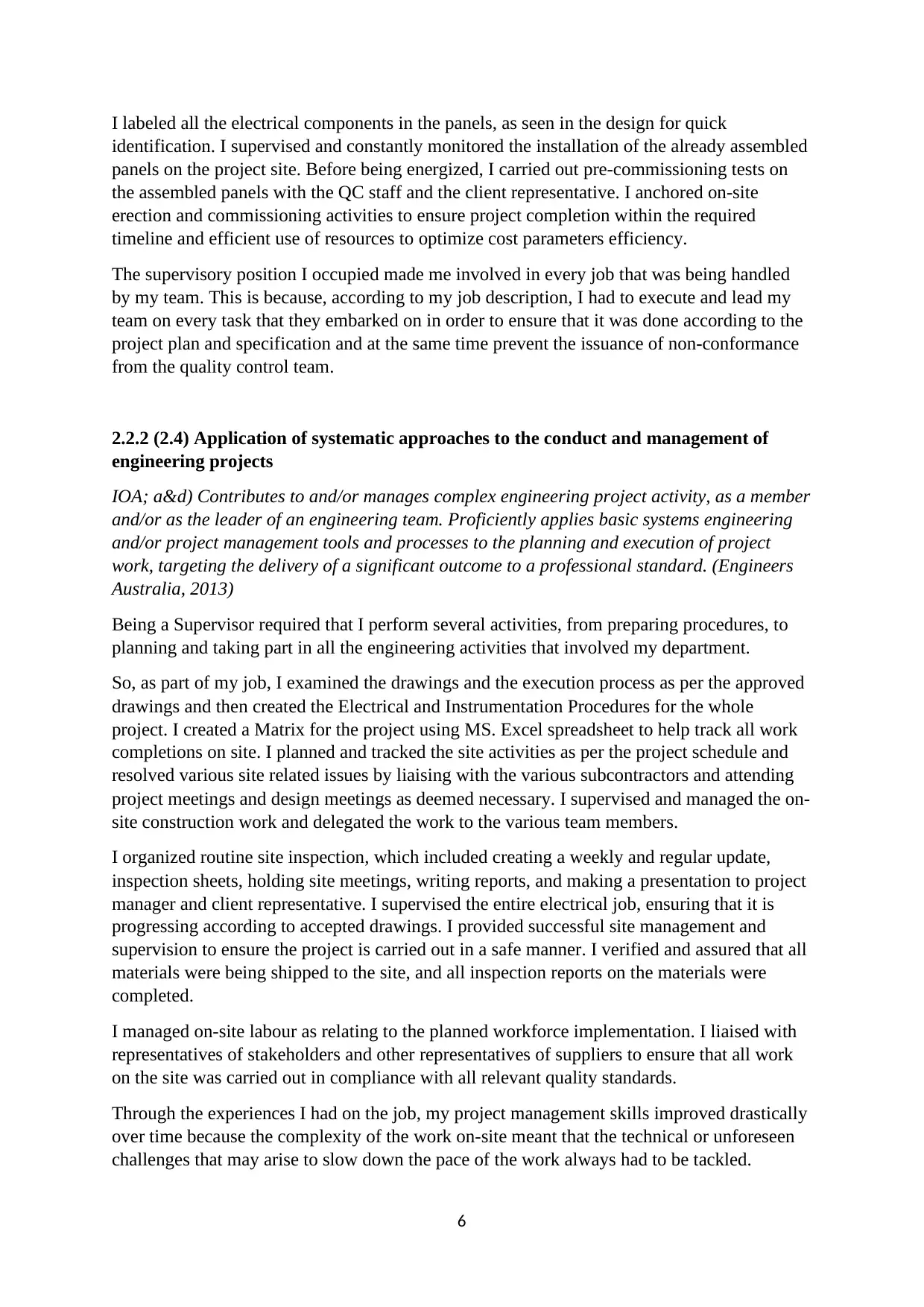
6
I labeled all the electrical components in the panels, as seen in the design for quick
identification. I supervised and constantly monitored the installation of the already assembled
panels on the project site. Before being energized, I carried out pre-commissioning tests on
the assembled panels with the QC staff and the client representative. I anchored on-site
erection and commissioning activities to ensure project completion within the required
timeline and efficient use of resources to optimize cost parameters efficiency.
The supervisory position I occupied made me involved in every job that was being handled
by my team. This is because, according to my job description, I had to execute and lead my
team on every task that they embarked on in order to ensure that it was done according to the
project plan and specification and at the same time prevent the issuance of non-conformance
from the quality control team.
2.2.2 (2.4) Application of systematic approaches to the conduct and management of
engineering projects
IOA; a&d) Contributes to and/or manages complex engineering project activity, as a member
and/or as the leader of an engineering team. Proficiently applies basic systems engineering
and/or project management tools and processes to the planning and execution of project
work, targeting the delivery of a significant outcome to a professional standard. (Engineers
Australia, 2013)
Being a Supervisor required that I perform several activities, from preparing procedures, to
planning and taking part in all the engineering activities that involved my department.
So, as part of my job, I examined the drawings and the execution process as per the approved
drawings and then created the Electrical and Instrumentation Procedures for the whole
project. I created a Matrix for the project using MS. Excel spreadsheet to help track all work
completions on site. I planned and tracked the site activities as per the project schedule and
resolved various site related issues by liaising with the various subcontractors and attending
project meetings and design meetings as deemed necessary. I supervised and managed the on-
site construction work and delegated the work to the various team members.
I organized routine site inspection, which included creating a weekly and regular update,
inspection sheets, holding site meetings, writing reports, and making a presentation to project
manager and client representative. I supervised the entire electrical job, ensuring that it is
progressing according to accepted drawings. I provided successful site management and
supervision to ensure the project is carried out in a safe manner. I verified and assured that all
materials were being shipped to the site, and all inspection reports on the materials were
completed.
I managed on-site labour as relating to the planned workforce implementation. I liaised with
representatives of stakeholders and other representatives of suppliers to ensure that all work
on the site was carried out in compliance with all relevant quality standards.
Through the experiences I had on the job, my project management skills improved drastically
over time because the complexity of the work on-site meant that the technical or unforeseen
challenges that may arise to slow down the pace of the work always had to be tackled.
I labeled all the electrical components in the panels, as seen in the design for quick
identification. I supervised and constantly monitored the installation of the already assembled
panels on the project site. Before being energized, I carried out pre-commissioning tests on
the assembled panels with the QC staff and the client representative. I anchored on-site
erection and commissioning activities to ensure project completion within the required
timeline and efficient use of resources to optimize cost parameters efficiency.
The supervisory position I occupied made me involved in every job that was being handled
by my team. This is because, according to my job description, I had to execute and lead my
team on every task that they embarked on in order to ensure that it was done according to the
project plan and specification and at the same time prevent the issuance of non-conformance
from the quality control team.
2.2.2 (2.4) Application of systematic approaches to the conduct and management of
engineering projects
IOA; a&d) Contributes to and/or manages complex engineering project activity, as a member
and/or as the leader of an engineering team. Proficiently applies basic systems engineering
and/or project management tools and processes to the planning and execution of project
work, targeting the delivery of a significant outcome to a professional standard. (Engineers
Australia, 2013)
Being a Supervisor required that I perform several activities, from preparing procedures, to
planning and taking part in all the engineering activities that involved my department.
So, as part of my job, I examined the drawings and the execution process as per the approved
drawings and then created the Electrical and Instrumentation Procedures for the whole
project. I created a Matrix for the project using MS. Excel spreadsheet to help track all work
completions on site. I planned and tracked the site activities as per the project schedule and
resolved various site related issues by liaising with the various subcontractors and attending
project meetings and design meetings as deemed necessary. I supervised and managed the on-
site construction work and delegated the work to the various team members.
I organized routine site inspection, which included creating a weekly and regular update,
inspection sheets, holding site meetings, writing reports, and making a presentation to project
manager and client representative. I supervised the entire electrical job, ensuring that it is
progressing according to accepted drawings. I provided successful site management and
supervision to ensure the project is carried out in a safe manner. I verified and assured that all
materials were being shipped to the site, and all inspection reports on the materials were
completed.
I managed on-site labour as relating to the planned workforce implementation. I liaised with
representatives of stakeholders and other representatives of suppliers to ensure that all work
on the site was carried out in compliance with all relevant quality standards.
Through the experiences I had on the job, my project management skills improved drastically
over time because the complexity of the work on-site meant that the technical or unforeseen
challenges that may arise to slow down the pace of the work always had to be tackled.
⊘ This is a preview!⊘
Do you want full access?
Subscribe today to unlock all pages.

Trusted by 1+ million students worldwide
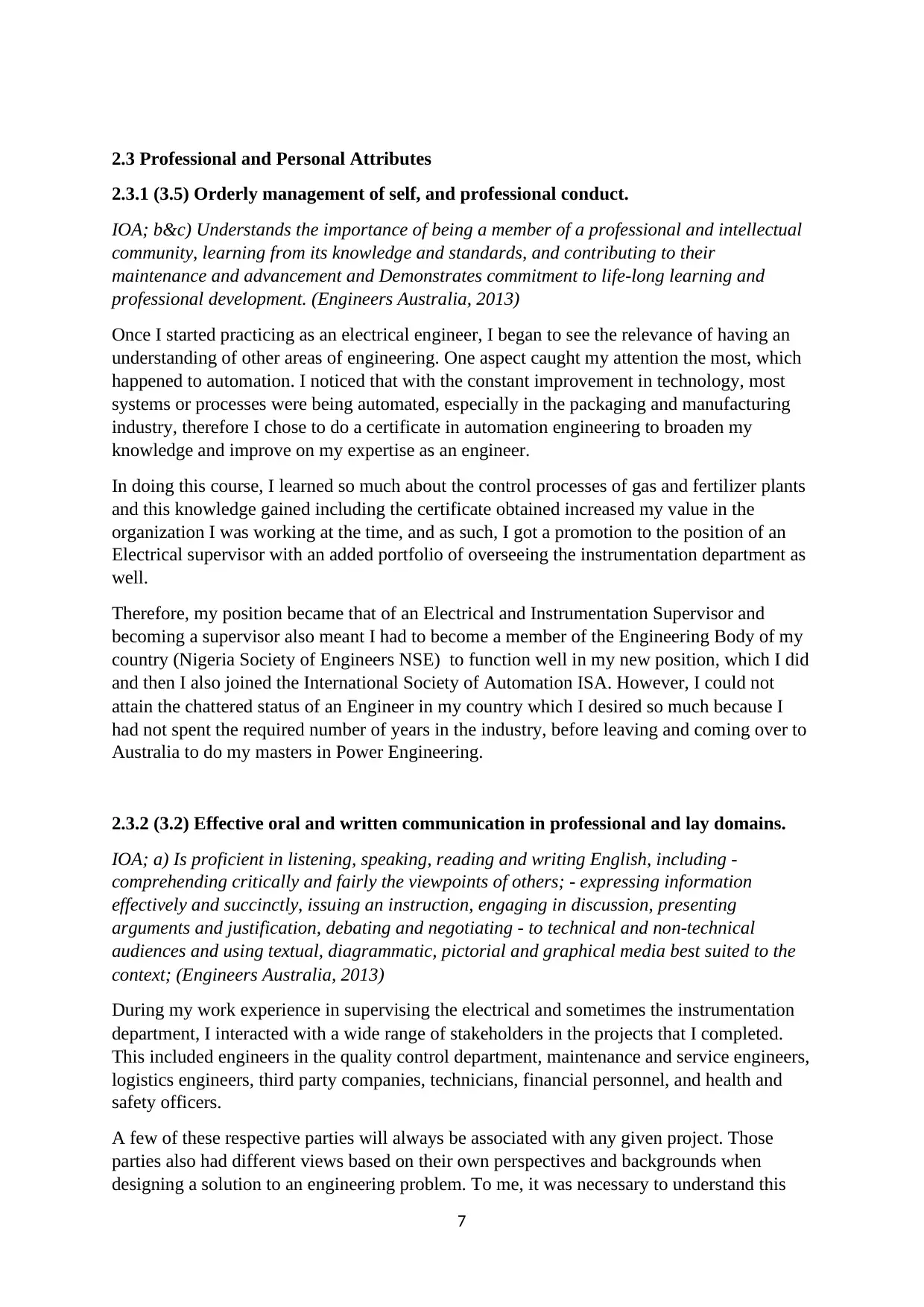
7
2.3 Professional and Personal Attributes
2.3.1 (3.5) Orderly management of self, and professional conduct.
IOA; b&c) Understands the importance of being a member of a professional and intellectual
community, learning from its knowledge and standards, and contributing to their
maintenance and advancement and Demonstrates commitment to life-long learning and
professional development. (Engineers Australia, 2013)
Once I started practicing as an electrical engineer, I began to see the relevance of having an
understanding of other areas of engineering. One aspect caught my attention the most, which
happened to automation. I noticed that with the constant improvement in technology, most
systems or processes were being automated, especially in the packaging and manufacturing
industry, therefore I chose to do a certificate in automation engineering to broaden my
knowledge and improve on my expertise as an engineer.
In doing this course, I learned so much about the control processes of gas and fertilizer plants
and this knowledge gained including the certificate obtained increased my value in the
organization I was working at the time, and as such, I got a promotion to the position of an
Electrical supervisor with an added portfolio of overseeing the instrumentation department as
well.
Therefore, my position became that of an Electrical and Instrumentation Supervisor and
becoming a supervisor also meant I had to become a member of the Engineering Body of my
country (Nigeria Society of Engineers NSE) to function well in my new position, which I did
and then I also joined the International Society of Automation ISA. However, I could not
attain the chattered status of an Engineer in my country which I desired so much because I
had not spent the required number of years in the industry, before leaving and coming over to
Australia to do my masters in Power Engineering.
2.3.2 (3.2) Effective oral and written communication in professional and lay domains.
IOA; a) Is proficient in listening, speaking, reading and writing English, including -
comprehending critically and fairly the viewpoints of others; - expressing information
effectively and succinctly, issuing an instruction, engaging in discussion, presenting
arguments and justification, debating and negotiating - to technical and non-technical
audiences and using textual, diagrammatic, pictorial and graphical media best suited to the
context; (Engineers Australia, 2013)
During my work experience in supervising the electrical and sometimes the instrumentation
department, I interacted with a wide range of stakeholders in the projects that I completed.
This included engineers in the quality control department, maintenance and service engineers,
logistics engineers, third party companies, technicians, financial personnel, and health and
safety officers.
A few of these respective parties will always be associated with any given project. Those
parties also had different views based on their own perspectives and backgrounds when
designing a solution to an engineering problem. To me, it was necessary to understand this
2.3 Professional and Personal Attributes
2.3.1 (3.5) Orderly management of self, and professional conduct.
IOA; b&c) Understands the importance of being a member of a professional and intellectual
community, learning from its knowledge and standards, and contributing to their
maintenance and advancement and Demonstrates commitment to life-long learning and
professional development. (Engineers Australia, 2013)
Once I started practicing as an electrical engineer, I began to see the relevance of having an
understanding of other areas of engineering. One aspect caught my attention the most, which
happened to automation. I noticed that with the constant improvement in technology, most
systems or processes were being automated, especially in the packaging and manufacturing
industry, therefore I chose to do a certificate in automation engineering to broaden my
knowledge and improve on my expertise as an engineer.
In doing this course, I learned so much about the control processes of gas and fertilizer plants
and this knowledge gained including the certificate obtained increased my value in the
organization I was working at the time, and as such, I got a promotion to the position of an
Electrical supervisor with an added portfolio of overseeing the instrumentation department as
well.
Therefore, my position became that of an Electrical and Instrumentation Supervisor and
becoming a supervisor also meant I had to become a member of the Engineering Body of my
country (Nigeria Society of Engineers NSE) to function well in my new position, which I did
and then I also joined the International Society of Automation ISA. However, I could not
attain the chattered status of an Engineer in my country which I desired so much because I
had not spent the required number of years in the industry, before leaving and coming over to
Australia to do my masters in Power Engineering.
2.3.2 (3.2) Effective oral and written communication in professional and lay domains.
IOA; a) Is proficient in listening, speaking, reading and writing English, including -
comprehending critically and fairly the viewpoints of others; - expressing information
effectively and succinctly, issuing an instruction, engaging in discussion, presenting
arguments and justification, debating and negotiating - to technical and non-technical
audiences and using textual, diagrammatic, pictorial and graphical media best suited to the
context; (Engineers Australia, 2013)
During my work experience in supervising the electrical and sometimes the instrumentation
department, I interacted with a wide range of stakeholders in the projects that I completed.
This included engineers in the quality control department, maintenance and service engineers,
logistics engineers, third party companies, technicians, financial personnel, and health and
safety officers.
A few of these respective parties will always be associated with any given project. Those
parties also had different views based on their own perspectives and backgrounds when
designing a solution to an engineering problem. To me, it was necessary to understand this
Paraphrase This Document
Need a fresh take? Get an instant paraphrase of this document with our AI Paraphraser
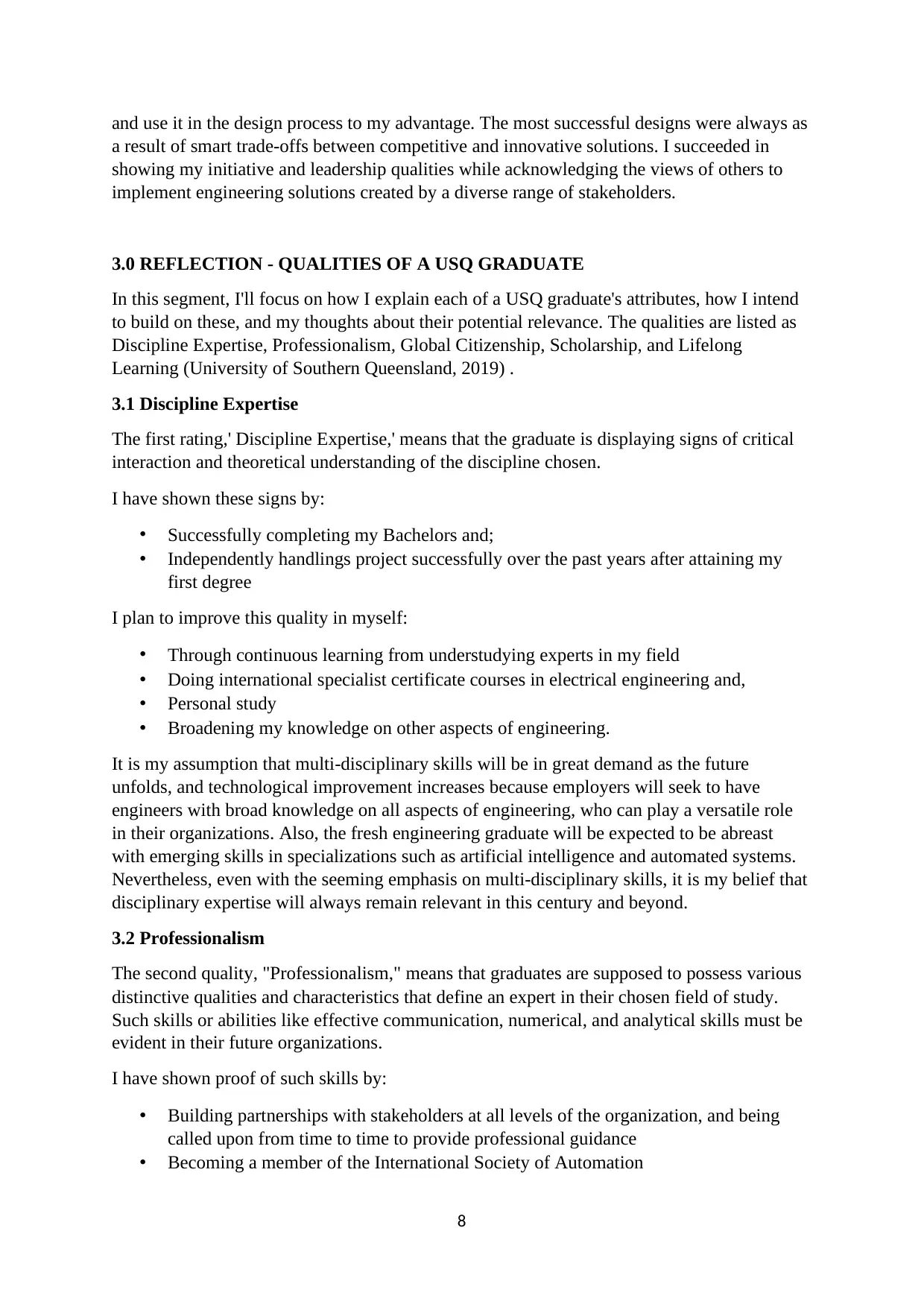
8
and use it in the design process to my advantage. The most successful designs were always as
a result of smart trade-offs between competitive and innovative solutions. I succeeded in
showing my initiative and leadership qualities while acknowledging the views of others to
implement engineering solutions created by a diverse range of stakeholders.
3.0 REFLECTION - QUALITIES OF A USQ GRADUATE
In this segment, I'll focus on how I explain each of a USQ graduate's attributes, how I intend
to build on these, and my thoughts about their potential relevance. The qualities are listed as
Discipline Expertise, Professionalism, Global Citizenship, Scholarship, and Lifelong
Learning (University of Southern Queensland, 2019) .
3.1 Discipline Expertise
The first rating,' Discipline Expertise,' means that the graduate is displaying signs of critical
interaction and theoretical understanding of the discipline chosen.
I have shown these signs by:
• Successfully completing my Bachelors and;
• Independently handlings project successfully over the past years after attaining my
first degree
I plan to improve this quality in myself:
• Through continuous learning from understudying experts in my field
• Doing international specialist certificate courses in electrical engineering and,
• Personal study
• Broadening my knowledge on other aspects of engineering.
It is my assumption that multi-disciplinary skills will be in great demand as the future
unfolds, and technological improvement increases because employers will seek to have
engineers with broad knowledge on all aspects of engineering, who can play a versatile role
in their organizations. Also, the fresh engineering graduate will be expected to be abreast
with emerging skills in specializations such as artificial intelligence and automated systems.
Nevertheless, even with the seeming emphasis on multi-disciplinary skills, it is my belief that
disciplinary expertise will always remain relevant in this century and beyond.
3.2 Professionalism
The second quality, "Professionalism," means that graduates are supposed to possess various
distinctive qualities and characteristics that define an expert in their chosen field of study.
Such skills or abilities like effective communication, numerical, and analytical skills must be
evident in their future organizations.
I have shown proof of such skills by:
• Building partnerships with stakeholders at all levels of the organization, and being
called upon from time to time to provide professional guidance
• Becoming a member of the International Society of Automation
and use it in the design process to my advantage. The most successful designs were always as
a result of smart trade-offs between competitive and innovative solutions. I succeeded in
showing my initiative and leadership qualities while acknowledging the views of others to
implement engineering solutions created by a diverse range of stakeholders.
3.0 REFLECTION - QUALITIES OF A USQ GRADUATE
In this segment, I'll focus on how I explain each of a USQ graduate's attributes, how I intend
to build on these, and my thoughts about their potential relevance. The qualities are listed as
Discipline Expertise, Professionalism, Global Citizenship, Scholarship, and Lifelong
Learning (University of Southern Queensland, 2019) .
3.1 Discipline Expertise
The first rating,' Discipline Expertise,' means that the graduate is displaying signs of critical
interaction and theoretical understanding of the discipline chosen.
I have shown these signs by:
• Successfully completing my Bachelors and;
• Independently handlings project successfully over the past years after attaining my
first degree
I plan to improve this quality in myself:
• Through continuous learning from understudying experts in my field
• Doing international specialist certificate courses in electrical engineering and,
• Personal study
• Broadening my knowledge on other aspects of engineering.
It is my assumption that multi-disciplinary skills will be in great demand as the future
unfolds, and technological improvement increases because employers will seek to have
engineers with broad knowledge on all aspects of engineering, who can play a versatile role
in their organizations. Also, the fresh engineering graduate will be expected to be abreast
with emerging skills in specializations such as artificial intelligence and automated systems.
Nevertheless, even with the seeming emphasis on multi-disciplinary skills, it is my belief that
disciplinary expertise will always remain relevant in this century and beyond.
3.2 Professionalism
The second quality, "Professionalism," means that graduates are supposed to possess various
distinctive qualities and characteristics that define an expert in their chosen field of study.
Such skills or abilities like effective communication, numerical, and analytical skills must be
evident in their future organizations.
I have shown proof of such skills by:
• Building partnerships with stakeholders at all levels of the organization, and being
called upon from time to time to provide professional guidance
• Becoming a member of the International Society of Automation
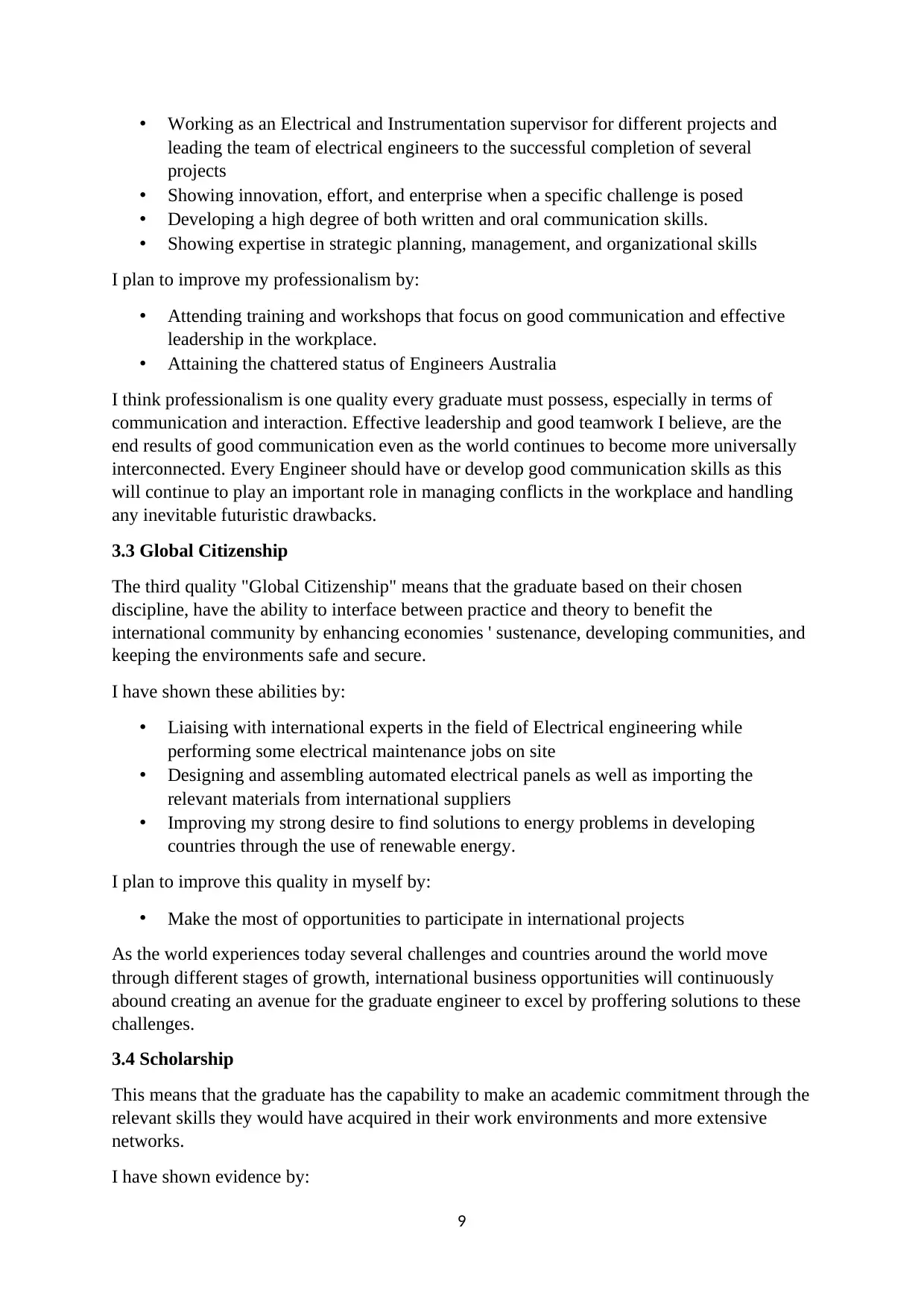
9
• Working as an Electrical and Instrumentation supervisor for different projects and
leading the team of electrical engineers to the successful completion of several
projects
• Showing innovation, effort, and enterprise when a specific challenge is posed
• Developing a high degree of both written and oral communication skills.
• Showing expertise in strategic planning, management, and organizational skills
I plan to improve my professionalism by:
• Attending training and workshops that focus on good communication and effective
leadership in the workplace.
• Attaining the chattered status of Engineers Australia
I think professionalism is one quality every graduate must possess, especially in terms of
communication and interaction. Effective leadership and good teamwork I believe, are the
end results of good communication even as the world continues to become more universally
interconnected. Every Engineer should have or develop good communication skills as this
will continue to play an important role in managing conflicts in the workplace and handling
any inevitable futuristic drawbacks.
3.3 Global Citizenship
The third quality "Global Citizenship" means that the graduate based on their chosen
discipline, have the ability to interface between practice and theory to benefit the
international community by enhancing economies ' sustenance, developing communities, and
keeping the environments safe and secure.
I have shown these abilities by:
• Liaising with international experts in the field of Electrical engineering while
performing some electrical maintenance jobs on site
• Designing and assembling automated electrical panels as well as importing the
relevant materials from international suppliers
• Improving my strong desire to find solutions to energy problems in developing
countries through the use of renewable energy.
I plan to improve this quality in myself by:
• Make the most of opportunities to participate in international projects
As the world experiences today several challenges and countries around the world move
through different stages of growth, international business opportunities will continuously
abound creating an avenue for the graduate engineer to excel by proffering solutions to these
challenges.
3.4 Scholarship
This means that the graduate has the capability to make an academic commitment through the
relevant skills they would have acquired in their work environments and more extensive
networks.
I have shown evidence by:
• Working as an Electrical and Instrumentation supervisor for different projects and
leading the team of electrical engineers to the successful completion of several
projects
• Showing innovation, effort, and enterprise when a specific challenge is posed
• Developing a high degree of both written and oral communication skills.
• Showing expertise in strategic planning, management, and organizational skills
I plan to improve my professionalism by:
• Attending training and workshops that focus on good communication and effective
leadership in the workplace.
• Attaining the chattered status of Engineers Australia
I think professionalism is one quality every graduate must possess, especially in terms of
communication and interaction. Effective leadership and good teamwork I believe, are the
end results of good communication even as the world continues to become more universally
interconnected. Every Engineer should have or develop good communication skills as this
will continue to play an important role in managing conflicts in the workplace and handling
any inevitable futuristic drawbacks.
3.3 Global Citizenship
The third quality "Global Citizenship" means that the graduate based on their chosen
discipline, have the ability to interface between practice and theory to benefit the
international community by enhancing economies ' sustenance, developing communities, and
keeping the environments safe and secure.
I have shown these abilities by:
• Liaising with international experts in the field of Electrical engineering while
performing some electrical maintenance jobs on site
• Designing and assembling automated electrical panels as well as importing the
relevant materials from international suppliers
• Improving my strong desire to find solutions to energy problems in developing
countries through the use of renewable energy.
I plan to improve this quality in myself by:
• Make the most of opportunities to participate in international projects
As the world experiences today several challenges and countries around the world move
through different stages of growth, international business opportunities will continuously
abound creating an avenue for the graduate engineer to excel by proffering solutions to these
challenges.
3.4 Scholarship
This means that the graduate has the capability to make an academic commitment through the
relevant skills they would have acquired in their work environments and more extensive
networks.
I have shown evidence by:
⊘ This is a preview!⊘
Do you want full access?
Subscribe today to unlock all pages.

Trusted by 1+ million students worldwide
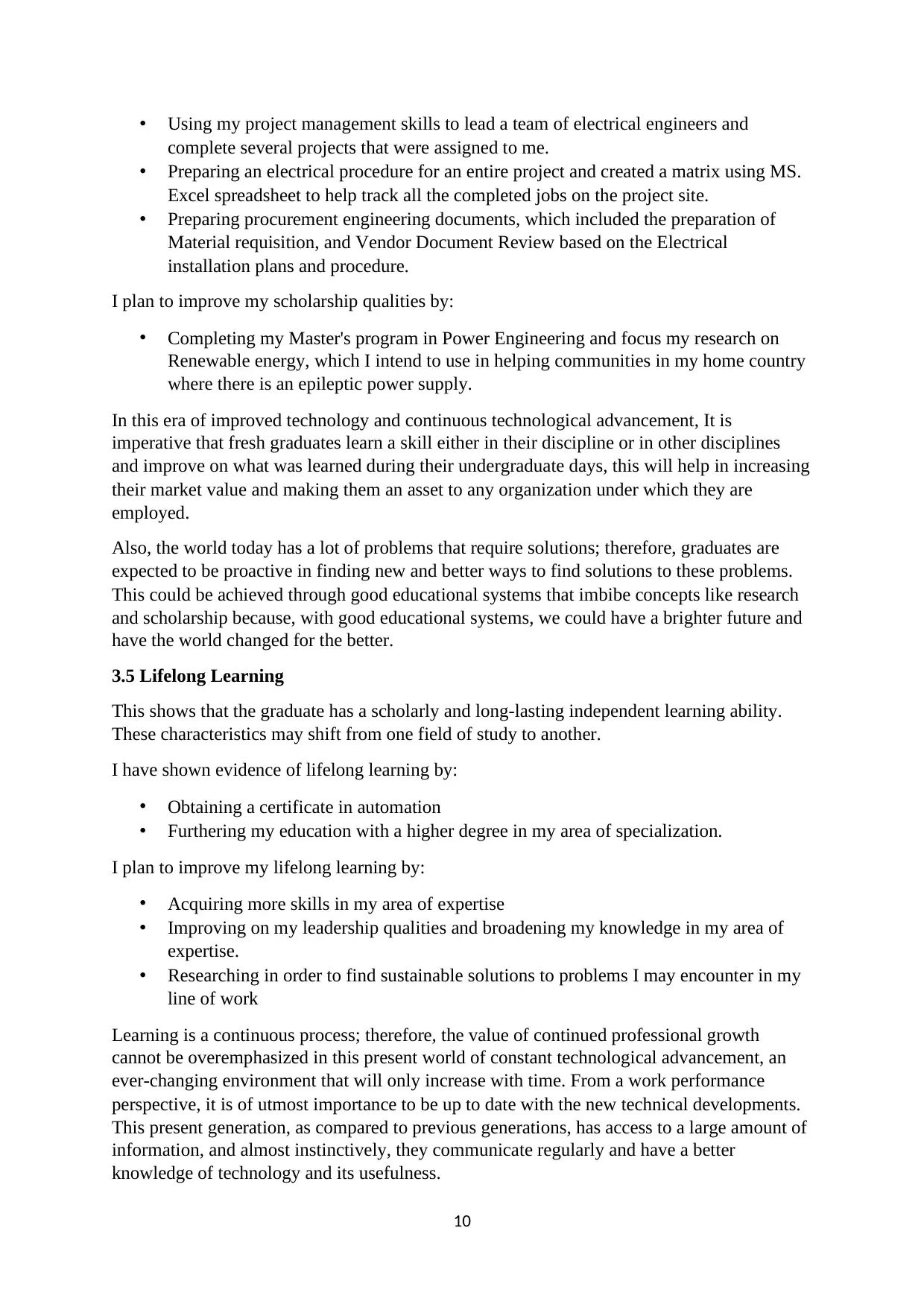
10
• Using my project management skills to lead a team of electrical engineers and
complete several projects that were assigned to me.
• Preparing an electrical procedure for an entire project and created a matrix using MS.
Excel spreadsheet to help track all the completed jobs on the project site.
• Preparing procurement engineering documents, which included the preparation of
Material requisition, and Vendor Document Review based on the Electrical
installation plans and procedure.
I plan to improve my scholarship qualities by:
• Completing my Master's program in Power Engineering and focus my research on
Renewable energy, which I intend to use in helping communities in my home country
where there is an epileptic power supply.
In this era of improved technology and continuous technological advancement, It is
imperative that fresh graduates learn a skill either in their discipline or in other disciplines
and improve on what was learned during their undergraduate days, this will help in increasing
their market value and making them an asset to any organization under which they are
employed.
Also, the world today has a lot of problems that require solutions; therefore, graduates are
expected to be proactive in finding new and better ways to find solutions to these problems.
This could be achieved through good educational systems that imbibe concepts like research
and scholarship because, with good educational systems, we could have a brighter future and
have the world changed for the better.
3.5 Lifelong Learning
This shows that the graduate has a scholarly and long-lasting independent learning ability.
These characteristics may shift from one field of study to another.
I have shown evidence of lifelong learning by:
• Obtaining a certificate in automation
• Furthering my education with a higher degree in my area of specialization.
I plan to improve my lifelong learning by:
• Acquiring more skills in my area of expertise
• Improving on my leadership qualities and broadening my knowledge in my area of
expertise.
• Researching in order to find sustainable solutions to problems I may encounter in my
line of work
Learning is a continuous process; therefore, the value of continued professional growth
cannot be overemphasized in this present world of constant technological advancement, an
ever-changing environment that will only increase with time. From a work performance
perspective, it is of utmost importance to be up to date with the new technical developments.
This present generation, as compared to previous generations, has access to a large amount of
information, and almost instinctively, they communicate regularly and have a better
knowledge of technology and its usefulness.
• Using my project management skills to lead a team of electrical engineers and
complete several projects that were assigned to me.
• Preparing an electrical procedure for an entire project and created a matrix using MS.
Excel spreadsheet to help track all the completed jobs on the project site.
• Preparing procurement engineering documents, which included the preparation of
Material requisition, and Vendor Document Review based on the Electrical
installation plans and procedure.
I plan to improve my scholarship qualities by:
• Completing my Master's program in Power Engineering and focus my research on
Renewable energy, which I intend to use in helping communities in my home country
where there is an epileptic power supply.
In this era of improved technology and continuous technological advancement, It is
imperative that fresh graduates learn a skill either in their discipline or in other disciplines
and improve on what was learned during their undergraduate days, this will help in increasing
their market value and making them an asset to any organization under which they are
employed.
Also, the world today has a lot of problems that require solutions; therefore, graduates are
expected to be proactive in finding new and better ways to find solutions to these problems.
This could be achieved through good educational systems that imbibe concepts like research
and scholarship because, with good educational systems, we could have a brighter future and
have the world changed for the better.
3.5 Lifelong Learning
This shows that the graduate has a scholarly and long-lasting independent learning ability.
These characteristics may shift from one field of study to another.
I have shown evidence of lifelong learning by:
• Obtaining a certificate in automation
• Furthering my education with a higher degree in my area of specialization.
I plan to improve my lifelong learning by:
• Acquiring more skills in my area of expertise
• Improving on my leadership qualities and broadening my knowledge in my area of
expertise.
• Researching in order to find sustainable solutions to problems I may encounter in my
line of work
Learning is a continuous process; therefore, the value of continued professional growth
cannot be overemphasized in this present world of constant technological advancement, an
ever-changing environment that will only increase with time. From a work performance
perspective, it is of utmost importance to be up to date with the new technical developments.
This present generation, as compared to previous generations, has access to a large amount of
information, and almost instinctively, they communicate regularly and have a better
knowledge of technology and its usefulness.
Paraphrase This Document
Need a fresh take? Get an instant paraphrase of this document with our AI Paraphraser
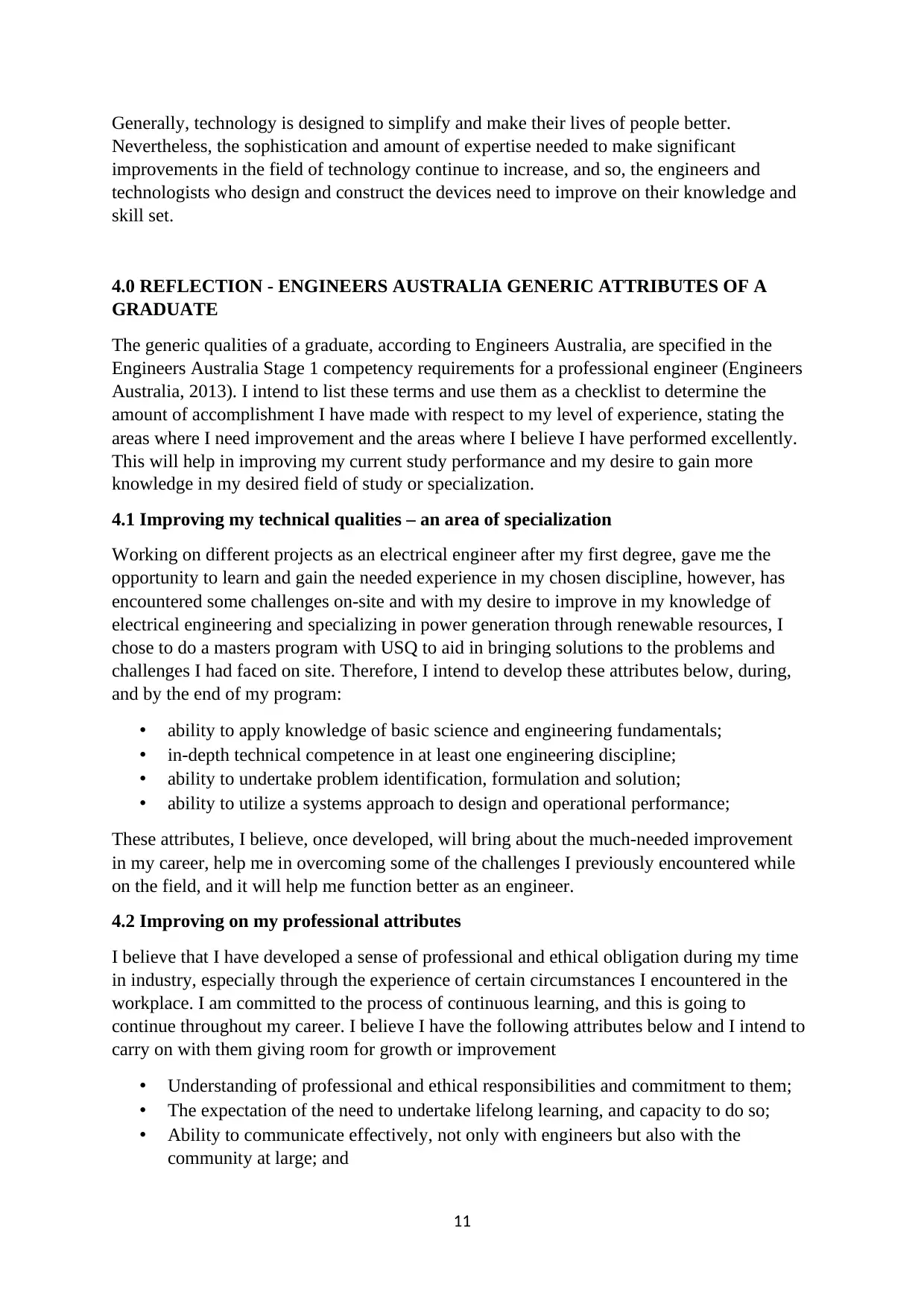
11
Generally, technology is designed to simplify and make their lives of people better.
Nevertheless, the sophistication and amount of expertise needed to make significant
improvements in the field of technology continue to increase, and so, the engineers and
technologists who design and construct the devices need to improve on their knowledge and
skill set.
4.0 REFLECTION - ENGINEERS AUSTRALIA GENERIC ATTRIBUTES OF A
GRADUATE
The generic qualities of a graduate, according to Engineers Australia, are specified in the
Engineers Australia Stage 1 competency requirements for a professional engineer (Engineers
Australia, 2013). I intend to list these terms and use them as a checklist to determine the
amount of accomplishment I have made with respect to my level of experience, stating the
areas where I need improvement and the areas where I believe I have performed excellently.
This will help in improving my current study performance and my desire to gain more
knowledge in my desired field of study or specialization.
4.1 Improving my technical qualities – an area of specialization
Working on different projects as an electrical engineer after my first degree, gave me the
opportunity to learn and gain the needed experience in my chosen discipline, however, has
encountered some challenges on-site and with my desire to improve in my knowledge of
electrical engineering and specializing in power generation through renewable resources, I
chose to do a masters program with USQ to aid in bringing solutions to the problems and
challenges I had faced on site. Therefore, I intend to develop these attributes below, during,
and by the end of my program:
• ability to apply knowledge of basic science and engineering fundamentals;
• in-depth technical competence in at least one engineering discipline;
• ability to undertake problem identification, formulation and solution;
• ability to utilize a systems approach to design and operational performance;
These attributes, I believe, once developed, will bring about the much-needed improvement
in my career, help me in overcoming some of the challenges I previously encountered while
on the field, and it will help me function better as an engineer.
4.2 Improving on my professional attributes
I believe that I have developed a sense of professional and ethical obligation during my time
in industry, especially through the experience of certain circumstances I encountered in the
workplace. I am committed to the process of continuous learning, and this is going to
continue throughout my career. I believe I have the following attributes below and I intend to
carry on with them giving room for growth or improvement
• Understanding of professional and ethical responsibilities and commitment to them;
• The expectation of the need to undertake lifelong learning, and capacity to do so;
• Ability to communicate effectively, not only with engineers but also with the
community at large; and
Generally, technology is designed to simplify and make their lives of people better.
Nevertheless, the sophistication and amount of expertise needed to make significant
improvements in the field of technology continue to increase, and so, the engineers and
technologists who design and construct the devices need to improve on their knowledge and
skill set.
4.0 REFLECTION - ENGINEERS AUSTRALIA GENERIC ATTRIBUTES OF A
GRADUATE
The generic qualities of a graduate, according to Engineers Australia, are specified in the
Engineers Australia Stage 1 competency requirements for a professional engineer (Engineers
Australia, 2013). I intend to list these terms and use them as a checklist to determine the
amount of accomplishment I have made with respect to my level of experience, stating the
areas where I need improvement and the areas where I believe I have performed excellently.
This will help in improving my current study performance and my desire to gain more
knowledge in my desired field of study or specialization.
4.1 Improving my technical qualities – an area of specialization
Working on different projects as an electrical engineer after my first degree, gave me the
opportunity to learn and gain the needed experience in my chosen discipline, however, has
encountered some challenges on-site and with my desire to improve in my knowledge of
electrical engineering and specializing in power generation through renewable resources, I
chose to do a masters program with USQ to aid in bringing solutions to the problems and
challenges I had faced on site. Therefore, I intend to develop these attributes below, during,
and by the end of my program:
• ability to apply knowledge of basic science and engineering fundamentals;
• in-depth technical competence in at least one engineering discipline;
• ability to undertake problem identification, formulation and solution;
• ability to utilize a systems approach to design and operational performance;
These attributes, I believe, once developed, will bring about the much-needed improvement
in my career, help me in overcoming some of the challenges I previously encountered while
on the field, and it will help me function better as an engineer.
4.2 Improving on my professional attributes
I believe that I have developed a sense of professional and ethical obligation during my time
in industry, especially through the experience of certain circumstances I encountered in the
workplace. I am committed to the process of continuous learning, and this is going to
continue throughout my career. I believe I have the following attributes below and I intend to
carry on with them giving room for growth or improvement
• Understanding of professional and ethical responsibilities and commitment to them;
• The expectation of the need to undertake lifelong learning, and capacity to do so;
• Ability to communicate effectively, not only with engineers but also with the
community at large; and
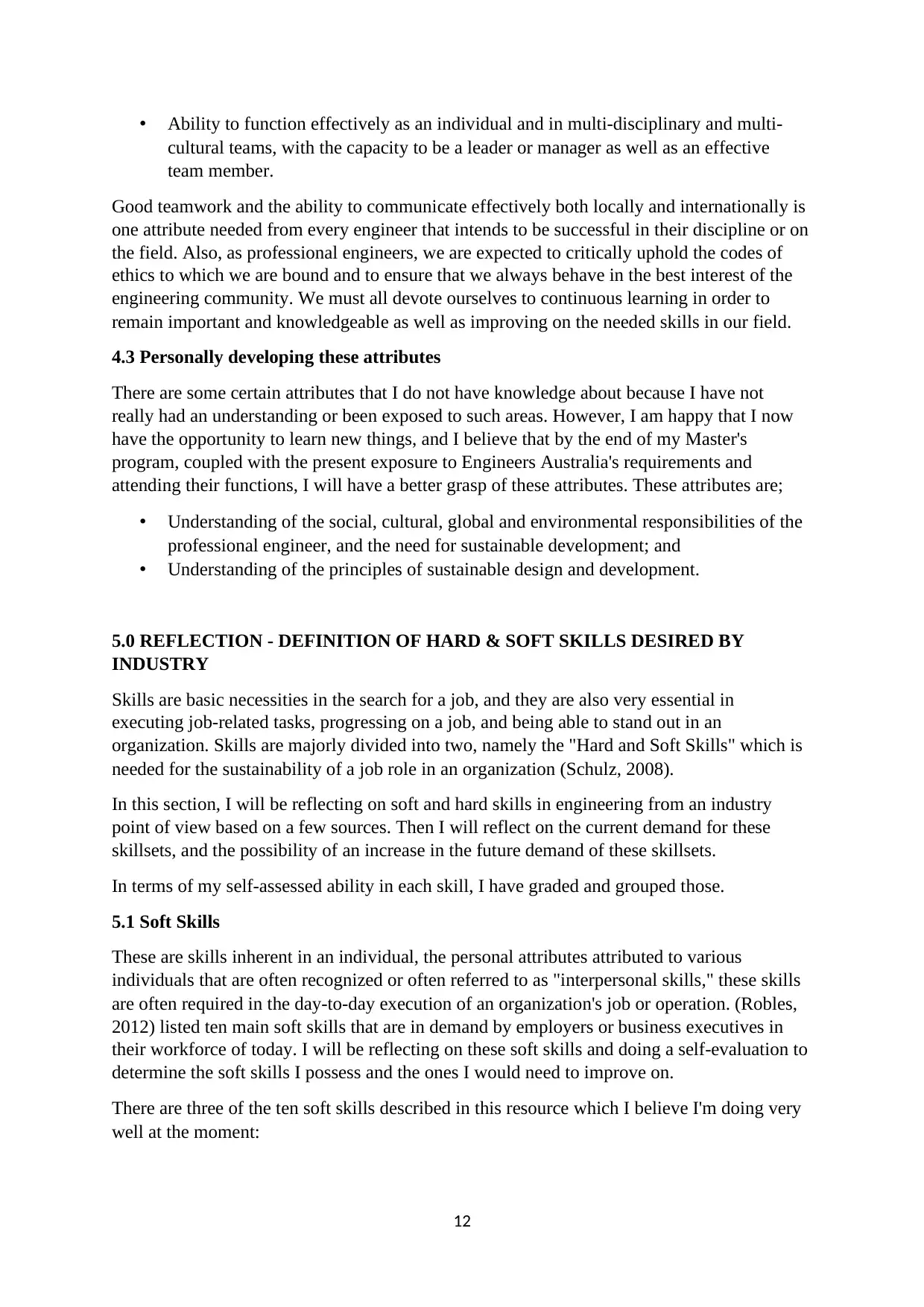
12
• Ability to function effectively as an individual and in multi-disciplinary and multi-
cultural teams, with the capacity to be a leader or manager as well as an effective
team member.
Good teamwork and the ability to communicate effectively both locally and internationally is
one attribute needed from every engineer that intends to be successful in their discipline or on
the field. Also, as professional engineers, we are expected to critically uphold the codes of
ethics to which we are bound and to ensure that we always behave in the best interest of the
engineering community. We must all devote ourselves to continuous learning in order to
remain important and knowledgeable as well as improving on the needed skills in our field.
4.3 Personally developing these attributes
There are some certain attributes that I do not have knowledge about because I have not
really had an understanding or been exposed to such areas. However, I am happy that I now
have the opportunity to learn new things, and I believe that by the end of my Master's
program, coupled with the present exposure to Engineers Australia's requirements and
attending their functions, I will have a better grasp of these attributes. These attributes are;
• Understanding of the social, cultural, global and environmental responsibilities of the
professional engineer, and the need for sustainable development; and
• Understanding of the principles of sustainable design and development.
5.0 REFLECTION - DEFINITION OF HARD & SOFT SKILLS DESIRED BY
INDUSTRY
Skills are basic necessities in the search for a job, and they are also very essential in
executing job-related tasks, progressing on a job, and being able to stand out in an
organization. Skills are majorly divided into two, namely the "Hard and Soft Skills" which is
needed for the sustainability of a job role in an organization (Schulz, 2008).
In this section, I will be reflecting on soft and hard skills in engineering from an industry
point of view based on a few sources. Then I will reflect on the current demand for these
skillsets, and the possibility of an increase in the future demand of these skillsets.
In terms of my self-assessed ability in each skill, I have graded and grouped those.
5.1 Soft Skills
These are skills inherent in an individual, the personal attributes attributed to various
individuals that are often recognized or often referred to as "interpersonal skills," these skills
are often required in the day-to-day execution of an organization's job or operation. (Robles,
2012) listed ten main soft skills that are in demand by employers or business executives in
their workforce of today. I will be reflecting on these soft skills and doing a self-evaluation to
determine the soft skills I possess and the ones I would need to improve on.
There are three of the ten soft skills described in this resource which I believe I'm doing very
well at the moment:
• Ability to function effectively as an individual and in multi-disciplinary and multi-
cultural teams, with the capacity to be a leader or manager as well as an effective
team member.
Good teamwork and the ability to communicate effectively both locally and internationally is
one attribute needed from every engineer that intends to be successful in their discipline or on
the field. Also, as professional engineers, we are expected to critically uphold the codes of
ethics to which we are bound and to ensure that we always behave in the best interest of the
engineering community. We must all devote ourselves to continuous learning in order to
remain important and knowledgeable as well as improving on the needed skills in our field.
4.3 Personally developing these attributes
There are some certain attributes that I do not have knowledge about because I have not
really had an understanding or been exposed to such areas. However, I am happy that I now
have the opportunity to learn new things, and I believe that by the end of my Master's
program, coupled with the present exposure to Engineers Australia's requirements and
attending their functions, I will have a better grasp of these attributes. These attributes are;
• Understanding of the social, cultural, global and environmental responsibilities of the
professional engineer, and the need for sustainable development; and
• Understanding of the principles of sustainable design and development.
5.0 REFLECTION - DEFINITION OF HARD & SOFT SKILLS DESIRED BY
INDUSTRY
Skills are basic necessities in the search for a job, and they are also very essential in
executing job-related tasks, progressing on a job, and being able to stand out in an
organization. Skills are majorly divided into two, namely the "Hard and Soft Skills" which is
needed for the sustainability of a job role in an organization (Schulz, 2008).
In this section, I will be reflecting on soft and hard skills in engineering from an industry
point of view based on a few sources. Then I will reflect on the current demand for these
skillsets, and the possibility of an increase in the future demand of these skillsets.
In terms of my self-assessed ability in each skill, I have graded and grouped those.
5.1 Soft Skills
These are skills inherent in an individual, the personal attributes attributed to various
individuals that are often recognized or often referred to as "interpersonal skills," these skills
are often required in the day-to-day execution of an organization's job or operation. (Robles,
2012) listed ten main soft skills that are in demand by employers or business executives in
their workforce of today. I will be reflecting on these soft skills and doing a self-evaluation to
determine the soft skills I possess and the ones I would need to improve on.
There are three of the ten soft skills described in this resource which I believe I'm doing very
well at the moment:
⊘ This is a preview!⊘
Do you want full access?
Subscribe today to unlock all pages.

Trusted by 1+ million students worldwide
1 out of 21
Related Documents
Your All-in-One AI-Powered Toolkit for Academic Success.
+13062052269
info@desklib.com
Available 24*7 on WhatsApp / Email
![[object Object]](/_next/static/media/star-bottom.7253800d.svg)
Unlock your academic potential
Copyright © 2020–2025 A2Z Services. All Rights Reserved. Developed and managed by ZUCOL.



